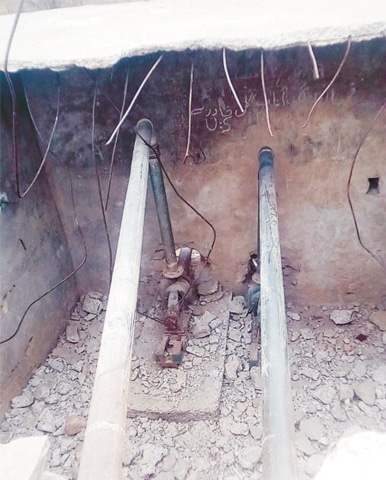
KOHAT: The 300 households of Manda Khel village in Dhodh union council have long been suffering from neglect by the successive governments.
Most of the households in the village have no electricity supply, while there is no middle or high school, paved streets and dispensary in the entire village.
The village is situated about 18 kilometres from a nearby dispensary and middle and high schools, and 35 kilometres from big hospitals and educational institutions in Kohat city.
The existing schools lack electricity and water supply.
The local elders, including Shah Zeb Anwar, Abdul Abbas, Taimoor Shah, Zahir Shah, Deedan Shah, Gulbat Khan, Saeed Khan, Shakir Khan and Bakhtiar Khan said that electricity poles were installed from the funds of then MNA Khurhseed Begum of Awami National Party in 2010, but most of the pylons had since been without wires. They pointed out that some households were supplied with electricity, but the rest were neglected.
They complained that Amjid Afridi, who remained adviser to the chief minister three times, had promised during the government of Awami National Party that he would ensure provision electricity to the whole area, but to no avail.
Similarly, they said due to absence of middle and high school both for boys and girls, the students had to stop their studies as their parents could not afford to send them to schools either in Kohat city or Shahdipur. They said there were only two primary schools in the area which were without electricity and water supply.
Despite health emergency enforced by the PTI government the area has no dispensary and even in minor cases we have to take the patients to Kohat, they complained.
The elders said the village’s streets had not been paved for 20 years and there was no proper drainage system despite the area came under the jurisdiction of the tehsil municipal administration.
They said the only source of income of the people was farming but as their lands were rain-fed irregular weather patterns affected the yield. They said a stream passing by the village should be used to irrigate their lands.
The elders regretted that state minister for Safron Sheharyar Afridi only came to the village during elections to get votes and make false promises.
They said due to lack of schooling, the young people had to work as labourers mainly in road construction works. They demanded a high school and a technical training centre so that the people could earn an honorable living and come out of extreme poverty.
They pointed out that the locals had long been facing water shortage as the public health engineering department failed to repair an out-of-order tube-well.
Published in Dawn, November 2nd, 2019











































Dear visitor, the comments section is undergoing an overhaul and will return soon.